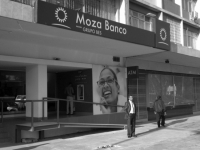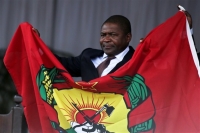Mozambique: Maputo (Mozambique)
2012/12/05

The Mayor of Maputo, David Simango, meeting on Wednesday with a large number of informal traders, declared that the City Council is not opposed to the informal sector, and that the measures it is taking are merely intended to discipline informal trade so that it does not endanger other interests.
In late February the council gave the informal vendors 48 hours to get off the city's pavements. But the Council soon backpedalled, saying that the intention was only to stop people selling outside schools, hospitals and other sensitive establishments. Simango said he never intended to shut down amount street trading.
On Wednesday, he said the government had no intention of closing the sprawling informal markets known as Estrela, Mandela 1 and 2, and Museu. But the Museu market (so called because it is adjacent to the Natural History Museum) is within a stone's throw of two largest educational establishments - the Maputo Commercial Institute and the Josina Machel Secondary School.
It is difficult to see how the Council can clear informal trade away from the vicinity of schools, from now on allow the stalls and informal bars of the Museu market to continue operating.
Simango repeated his claim that there are over 80,000 informal vendors in the city, and argued that their activity sustains themselves and their families, creates jobs and contributes to economic increase and social stability.
"We are not against the activity of the informal sector, since we know that people are selling on the streets not out of pleasure, but as a question of need for their survival", he said. "But we have to find ways of developing informal trade without creating problems for everybody else".
Among the measures ordered by the Council, he explained, was that vendors in the central among of the city must clean up the streets where they operate twice a day, rather than the previous arrangement of twice a week.
"Now there are areas where products cannot be sold, such as outside schools or hospitals or in front of defence and security institutions", Simango added. "And it's in these places where the owners have been notified to remove their stalls".
He urged the traders to respect municipal by-laws. These national that Maputo markets close at 19.00 and stalls outside the markets at 21.00. Those closing hours must be respected, the Mayor said, and anyone found with a stall open after 21.00 would be penalized.
"The best thing to do about by-laws is to respect them", he said. "Obeying the by-laws is obligatory. If the vendors disagree with the closing time, they should propose an alteration which can be discussed by municipal citizens and then submitted to the Municipal Assembly for approval".
But among the other city by-laws there is one that bans informal trade along several largest Maputo avenues. This by-law is quite disregarded, and currently the municipal police are making no effort to enforce it.
There were bitter complaints at the meeting against the municipal police, who were accused of seizing goods without any explanation of why, and without telling the vendors where their products were being taken.
Simango pointed out that the vendors can recover seized goods - but they have to be quick. The by-laws national that perishable goods are stored for three hours in the municipal warehouse, after which they are delivered to hospitals, orphanages, old people's homes and other social institutions.
Non-perishable goods are kept for eight days, and if the owners do not reclaim them within that time, they are sold at public auction and the proceeds revert to the national. When they reclaim the goods, the vendors, if they have been violating the by-laws governing trade, must pay a fine.
Some vendors complained of extortion and robbery by the municipal police. Simango said the Council condemns theft and policemen who behave in this way risk disciplinary action, and punishments that can include expulsion.
- Related Articles

safewater
2015/11/12 Gal Water Technologies Ltd. is backed by 20 years of experience in supplying water treatment systems for Industrial, Agricultural and Consumable water.
Mozambique’s ex-president Joaquim Chissano talks to PM Communications about the country’s major achievements
2015/09/18 Mozambique’s ex-president Joaquim Chissano talks to PM Communications about the country’s major achievements as it completes its 40th anniversary of independence. He takes the luck to criticize the attitude of Renamo – the major opposition party – as it threatens to return to war for not recognizing the victory of Frelimo in the last elections.
The Mozambique banking sector
2015/07/26 The Mozambique banking sector, which has high increase and good business prospects arising from foreign investment in exploration of natural resources, is attracting the attention of major international banks, according to Eaglestone Securities.
Mozambique is a target country in the internationalisation of China
2015/07/06 Mozambique is a target country in the internationalisation of China Three Gorges and China National Grid and two major hydroelectric projects that are being launched are of interest to these Chinese groups and their Portuguese subsidiaries. Paul Muxanga, chairman of the Cahora Bassa Hydroelectric Dam (HCB), said recently that the long-awaited construction of the northern plant of the Cahora Bassa hydroelectric facility should be initiated any minute at this time, a project which, according to the Portuguese financial daily Diário Económico, is “in the sights” of the two Chinese groups.
Mozambique's ambitious new executive
2015/06/24 Mozambique's ambitious new executive must find ways to bridge a set of gaps: between the core and the periphery; between political parties - established and new; and between the interests of business and the stark fact that Mozambique remains extremely poor, according to a new statement. Recent political developments in Mozambique mark the beginning of an significant era. The party of government, the Mozambique Liberation Front (FRELIMO), is clearly anxious to back the newly elected chief of national, Filipe Nyusi, who - following an initial tussle with his predecessor - is apparently keen to open a different style of dialogue with his rivals both part the country's opposition parties and within FRELIMO itself. This apparent political maturing comes at a time at the same time as the prospect of significant economic transition is gaining ground.
- Mozambique News
-
- DJIBOUTI CITY: East Africa moves to curb used car imports, boost local assembly plants
- CHINA: Support from China for the industrialisation of Angola and Mozambique
- MOZAMBIQUE: Mozambique seeks investors interested in graphite processing in Ancuabe
- MOZAMBIQUE: Mozambique government wants to increase financial inclusion of the population
- BOTSWANA: Routes Africa forum aims to improve African air connectivity
- BOTSWANA: Economic integration is helping boost trade and investment in Africa
- Trending Articles
-
- AUSTRALIA: Australia election: Over 15 million voters likely to exercise their franchise
- MALAWI: This $6 a month solar energy plan could power a million homes in Africa by 2017
- SOUTH AFRICA: South Africa’s Biggest Labor Group to Balance Pay With Job Security
- NIGERIA: Lagos hosts 2016 Africa fashion week Nigeria
- ISRAEL: Israeli PM to embark on historic Africa visit boosting diplomatic, economic ties
- CHINA: Forty-six Chinese-owned companies registered in Guinea-Bissau




.gif?1356023993)






